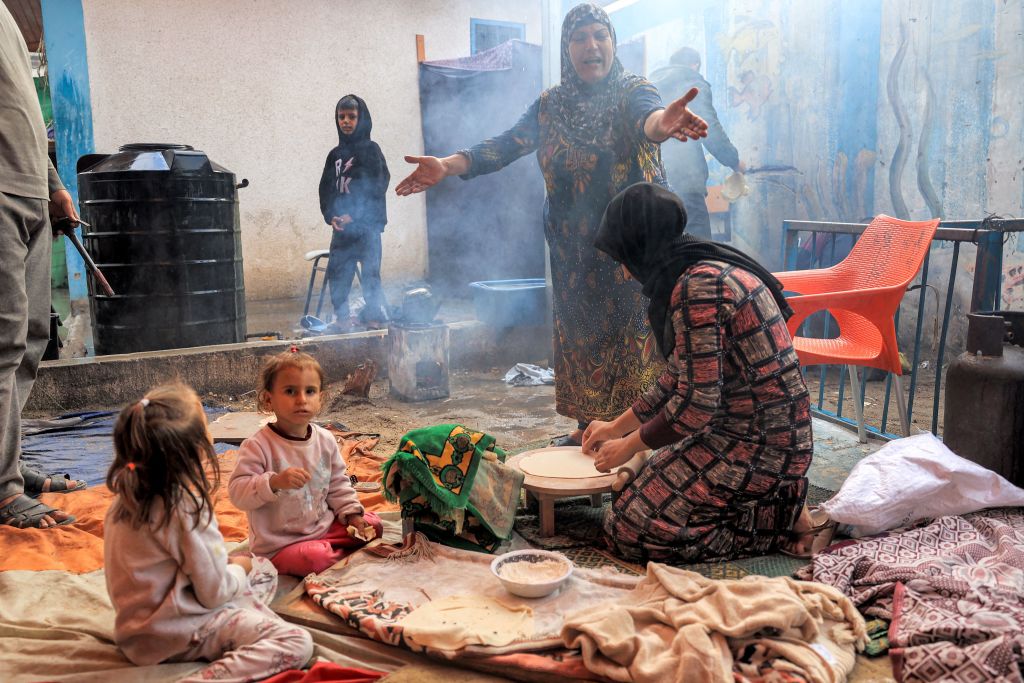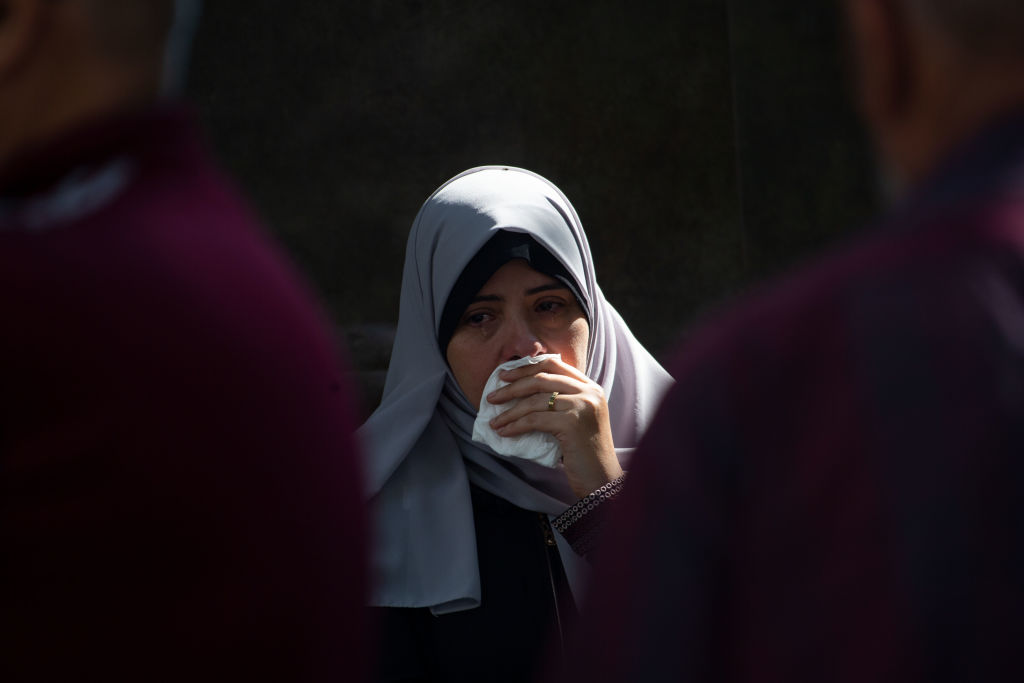GAZA—As bombs rain down on Gaza, Maryam Abu Akar has managed to escape death twice. But her loved ones have not. Maryam’s 17-year-old daughter, Sarah, was killed when a bomb landed on their two-story home on Oct. 17—ripping the teenager’s body in half.
In the wake of Sarah’s death, Maryam relied on her husband, Salama, for support. “He helped me bear the loss of my daughter. He told me that everything would be better and that our daughter went to heaven,” the 40-year-old said in an interview in her husband’s family home in Khan Younis, a city in southern Gaza.
Seven weeks later, Salama was chatting with a neighbor when a bomb landed nearby, killing them both. In an instant, Maryam became a widow—and the sole caregiver for their remaining four children. She is far from alone. Thousands of women in Gaza have been widowed by the war or left in charge of households, and aid experts fear that their worsening plight is being overlooked in the humanitarian response.
“I do not know how I will face his absence and raise the children without him,” Maryam said, tears streaming down her pallid cheeks. “Sometimes, when the children make me angry, I tell them: ‘I will call your father.’ And then I remember that he is not here.”
Maryam’s late daughter and husband are among more than 23,000 Palestinians who have been killed in Israeli attacks on Gaza since early October—with about 70 percent of the victims estimated to be women and children—according to CARE International, a global humanitarian organization.
On Oct. 7, the Palestinian militant group Hamas attacked southern Israel, killing about 1,200 people—mainly civilians—and taking more than 240 hostage, according to Israeli figures. Growing evidence is emerging of widespread sexual violence by the Hamas attackers against Israeli women and girls.
Israel responded to the attack with a massive bombing campaign in Gaza that has resulted in the highest civilian death toll in the long-running conflict since 2005. More than 2,780 women in Gaza have been widowed, data from U.N. Women Arab States shows. With at least 85 percent of Gaza’s 2.3 million residents displaced and food, fuel, medicine, and water scarce, these newly female-headed households are struggling to cope, several humanitarian organizations said.
These women not only have to contend with a deeply rooted patriarchal society and systemic legal inequities, but they are now increasingly vulnerable to gender-based violence, unable to support themselves and their families, and lack access to organizations that can help them—be it with food, safe shelter, or health care, several aid experts said.
“Most of the burden will be on the women,” said Lucy Talgieh, head of the women’s program at the Palestinian Conflict Transformation Center, a civil society organization based in Bethlehem. “They have to be strong—to live, and to help their children, and to start a new life, maybe with an injured husband who has become disabled, or maybe as a widow with four to five children to care for.”

Laws in Gaza place women under the protection and guardianship of men, and fail to protect female citizens against honor killings, marital rape, and domestic violence, the United Nations said in a 2018 report.
A woman can lose her right to spousal maintenance if she chooses to leave her husband’s home, and in 2021, a Hamas-run Islamic court ruled that women need the permission of men to travel in Gaza.
Although female literacy rates are high in Gaza, only 17 percent of women were active in the workforce as of 2021, compared to 69 percent of men, data from the Palestinian Central Bureau of Statistics shows.
In 2017, Gaza had the world’s highest unemployment rate at 44 percent, according to the United Nations Conference on Trade and Development. Most women in Gaza have never had a formal job, and now, even if they could work, there are virtually no opportunities available because of the war.
At least two-thirds of jobs in Gaza have been lost since the war started—roughly 192,000 jobs—the International Labour Organization said in late December, warning that women working in agriculture could lose out if rising unemployment results in men taking their jobs.
Maryam married at 20 and never finished university. She has been a housewife almost her entire adult life and was financially dependent on her late husband, who earned about $9 a day selling clothes in a market.
“I got used to relying on him to raise my children. He was the only breadwinner for us,” Maryam said. “I am not accustomed to bearing the responsibility alone. I do not know how I will continue the path with my children.”
For Gaza’s widows, grief and the trauma of war are compounded by the challenge of suddenly becoming the sole breadwinner, aid workers said.
CARE International said some mothers are only eating once a day because they are putting their children’s health first amid World Food Programme warnings that cases of dehydration and malnutrition are rising.
“There are heightened feelings of fear, anxiety, grief, and anger, and in an emergency, this is associated with the breakdown of social structures, family separation, and the disruption of support networks,” said Nour Beydoun, the regional advisor on protection and gender in emergencies for CARE.
As many women’s organizations in Gaza struggle to remain operational, CARE is working with community leaders and influencers to organize support networks and provide psychosocial support.
Such activities are a reminder of normal life and crucial in helping to “preserve and protect the human soul,” said Sanam Anderlini, the founder and CEO of the International Civil Society Action Network, a women, peace, and security organization.
“I think Palestinians have learned and instinctively understood that to preserve normalcy is itself a form of resistance,” she added.
For serious mental health issues, CARE is attempting to tap into the existing health care infrastructure to get people referred to psychiatrists and provided with medication.
However, Gaza’s only psychiatric hospital stopped functioning in November after it was damaged in an attack. As of mid-December, less than a third of Gaza’s 36 hospitals were still operating, and only partially, according to the World Health Organization.
Research by a range of organizations from the World Bank to the U.N. Human Rights Office has found that gender-based violence, including sexual exploitation and trafficking, increases during war and in post-conflict situations due to economic hardship, displacement, and the breakdown of social structures.
“The first thing that happens is that levels of poverty force women into risky work, like sex work, and forces children into work early,” Anderlini said. “We also see a huge spike in early marriage of girls.”
About 1.4 million Palestinians in Gaza are currently residing in U.N. shelters, and aid agencies have warned that overcrowding in such spaces increases the risk of abuse against women and girls.
Helping widows and female heads of household to find work and make money to support their families is a key way to prevent women and children from being forced to turn to high-risk work as their only option, according to Anderlini and Talgieh.
For example, the Palestinian Conflict Transformation Center is planning to help women join the workforce and develop their own money-making enterprises, as well as provide seed funding for small businesses.
“They will be working, even on a small-scale level at home selling things, but they will find their way with the help of the community, the [nongovernmental organizations],” Talgieh said. “These women have to find ways to survive, and they will.”
One such woman, Widad Abu Jama, a mother of six, recently lost her husband. The 45-year-old said Israeli soldiers shot and killed him when he went to his farm to check on his livestock and look for food for his family.
“I feel like I lost my life, not just my husband,” Jama said, sitting in the crowded classroom of a school that is now being used as a U.N. shelter. Her children were huddled around her, crying from the hunger and the cold.
“I got married at the age of 15. I lived with my husband for a very long time, and I grew up in his house. We worked together on our agricultural land. We spent long hours taking care of the crop. We built our lives together,” Jama explained.
“Now I will go to the land without him. I will be alone among the crops.”


 Ruwaida Amer
Ruwaida Amer
